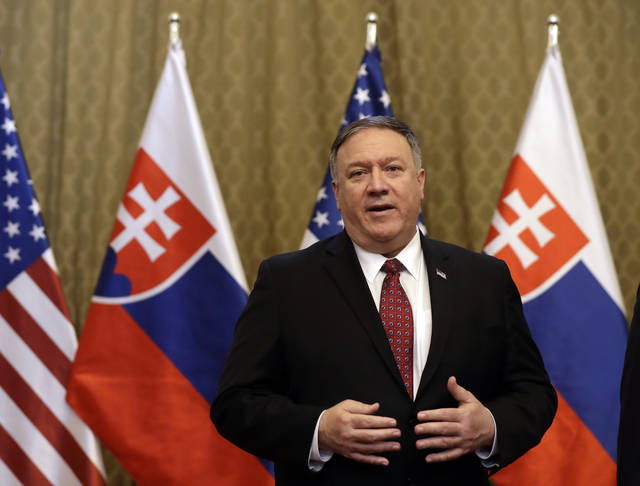WARSAW, Poland — U.S. Secretary of State Mike Pompeo on Tuesday invoked the 30th anniversary of the demise of communism to implore countries in Central and Eastern Europe to resist Chinese and Russian influence.
Speaking on a five-nation tour of Europe, Pompeo said China and Russia pose twin threats to the democratic and free-market gains made since the fall of the Berlin Wall in 1989.
He said the post-communist countries are particularly vulnerable to Chinese and Russian predatory investment and political meddling. Specifically, he called out European dependence on Russian energy, Russia’s backing of the Nord Stream 2 pipeline that many fear will increase that reliance and China’s entry into Europe’s telecommunications market through the high-tech company Huawei.
To combat the threat, he said, the U.S. will boost engagement in the region, through defense cooperation agreements and exchange programs and he repeatedly made the point that he believes he is reversing a decade of what he called U.S. “disengagement” in Central and Eastern Europe that created a “vacuum” Russia and China have exploited. Over the course of the past 10 years, he said, Russian President Vladimir Putin and Chinese leaders have become much more aggressive in the region and made inroads.
“Moscow continues to use (energy) as a political weapon for its geopolitical purposes,” Pompeo said in Warsaw, the third stop on his tour that began in Hungary and Slovakia. “We continue to work with Poland and other like-minded European allies and partners to stop Russia’s proposed Nord Stream 2 pipeline, which would undermine European energy and national security while also hurting Ukraine.”
The Russian-German pipeline is being built under the Baltic Sea to deliver gas directly to Germany for further distribution across Europe, increasing the route’s capacity over what already flows through the first Nord Stream pipeline. But Eastern European countries like Poland and Ukraine have vehemently objected to the project because they say it specifically bypasses their territories.
Earlier in Bratislava, where he was the first secretary of state to visit in nearly 20 years, Pompeo made similar remarks and noted that Slovakia, because of its history and geography, has “a special appreciation for the aggressive role Russia continues to play in the region,” particularly in Ukraine.
But, he said, “Russia is not the only nation that seeks to erode sovereignty and freedom in Europe.”
Pompeo said he had raised with Slovak officials the “need to guard against China’s economic and other efforts to create dependence and manipulate your political system.”
“It’s real, it’s intentional and they are trying to do things that undermine your sovereignty,” he said.
In Warsaw, Pompeo renewed a warning he delivered on Monday in Budapest that the United States may be forced to scale back certain operations in Europe and elsewhere if countries continue to do business with Huawei. He said the U.S. had strong concerns about Huawei’s motives in Europe, especially in NATO and European Union member states, as well as its business practices.
“We’ve made known the risks that are associated with that, risks to private information of citizens of the country, risks that comes from having that technology installed in network systems,” he said.
The U.S. has been warning countries about the risks of Chinese telecom technology as governments choose providers for the rollout of 5G wireless internet, which will enable faster download speeds along with greater connectivity among devices.
U.S. officials argue that under Chinese security laws companies such as Huawei or ZTE could be compelled to hand over data or access to Chinese intelligence.
China has said the U.S. is trying to suppress a rising competitor, and on Tuesday it lashed out at Pompeo’s comments.
“For some time, the U.S. has spared no effort to churn out all kinds of unwarranted charges against and fabricate various kinds of China threats theory,” Chinese foreign ministry spokeswoman Hua Chunying said. “It flagrantly threatened and drove a wedge into the relationship between China and other countries and slandered and cracked down on Chinese companies’ legitimate development rights and interests.”
She called the campaign “neither fair nor moral” and “bullying.”
“We hope that all parties can abandon ideological prejudice and zero-sum thinking and provide fair, just, open, inclusive, transparent and standardized conditions and environment for normal friendly and win-win cooperation,” she said.
Huawei, which manufactures telecommunications equipment and consumer electronics, also pushed back.
“We would encourage all governments to take an objective look at the evidence and maintain an open, engaged approach to 5G and other network developments,” said William Wu, the CEO of Huawei Technologies Hungary. “We believe the solution to more secure networks lies in cooperation across the whole industry. Excluding one supplier from technological developments in cyber security will damage technical and economic progress and harm competition in the ICT market.”


